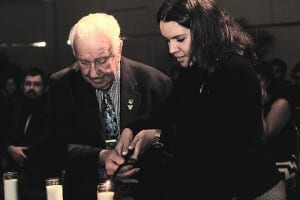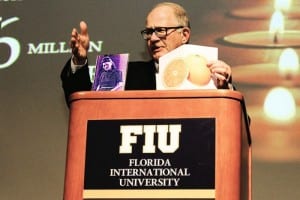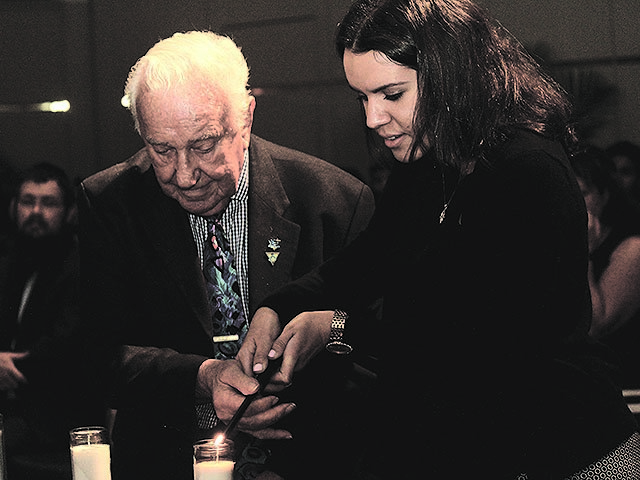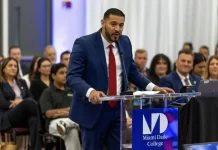
The Holocaust Remembrance Day Commemoration Event at Florida International University was conceived of, organized and presented by student members of Hillel and brothers of the Zeta Beta Tau fraternity.
“Today marks the International Holocaust Day of Remembrance and, more specifically, the liberation of Auschwitz (concentration camp) 71 years ago,” said Benjamin Kirshblum, Jewish Heritage chair of the fraternity and project manager for the event.
The solemn ambiance was enhanced by the strains of John Williams musical score from the movie Schindler’s List.
“I am profoundly touched, working with students who truly understand the importance of never again!” said Jessica Kronis, executive director of Hillel.
Dr. Mark Rosenberg, FIU president, a Zeta Beta Tau alum and son of a Holocaust survivor, and Michael Marder, a 90-year-old Holocaust survivor, shared with a standing-room-only Graham Center ballroom audience, personal experiences associated with one of the darkest periods of the 20th Century.
Dr. Rosenberg spoke about when he and his family visited, in July 2002, the site of his mother’s imprisonment at Auschwitz/Birkenau.

“In Auschwitz and Birkenau, one really comes face to face, with unparalleled, bureaucratic evil that is ruthless, remorseless and infinitely inhumane. The story has to be told and retold,” Dr. Rosenberg said.
He displayed two poignant visuals during his remarks about his late mother. One was a 1950s vintage sepia photograph of his mother as a beautiful young woman, with the numbers 52436 tattooed on her arm during her three-year incarceration in Auschwitz concentration camp.
The other was a luscious color photo of a whole orange with a juicy slice of orange overlapping the whole fruit.
“I asked my mother how she was able to get through those horrible days,” Dr. Rosenberg said. “I asked her what she thought about. The answer she gave me was really remarkable for its simplicity, and so I want to tell you what she said.
“She focused on the possibility that if she was to survive, of eating a fresh orange. And think about that in terms of how much we take for granted.”
She was liberated by an American, a U.S. Army Captain, whom she subsequently married and who was Dr. Rosenberg’s father.
He concluded with the idea that, “While the Holocaust was for her, defining but [it was] not definitive.”
The lesson he chose to promote was: “We are here to rededicate ourselves to a better world, a better life, to making things better every day going forward.”
Michael Marder’s ancestors originated from Toledo, Spain and their family name was Lamadera, Spanish for wood, as the family business was forestry and wood products. After emigrating from Spain to Germany, the family name changed to Marder, German for mink, as the family business changed to the fur trade.
Michael Marder was born in the small Polish village of Gorlice in 1925. At the age of 14 years old he was separated from his parents and family, and incarcerated by the Nazi regime, as a slave laborer, due to his Jewish lineage.
He was liberated by the partisans in Janiszow, Poland, but found that “After liberation, there was no place to go.” He was recaptured and sent to Majdanek Concentration Camp, then Budzyn. In all, he was transferred to nine different concentration camps, contracted and survived scarlet fever and finally was liberated from Bergen-Belsen in April 1945 by British troops.
Today, Marder lives in Delray Beach. His son is a dermatologist in Palm Beach and is the father of six children and has two grandchildren.
Marder’s daughter lives in Monsey, NY, and is the mother of three children and has three grandchildren. Marder is a proud and thankful great grandfather of eight.
Following the speakers, Rabbi Levi Friedman, Chabad FIU’s rabbi, delivered El Malei, a prayer for the soul of the departed. A deeply moving candlelighting ceremony followed, after which Yoel Rotterman led Kaddish, a prayer that references Divine Justice at the passing of the deceased.
Alexia Tzadok, president of Hillel at FIU, remarked in closing, “Now more than ever it is vital that we continue to honor the memory of those who perished at the hands of the Nazis, and preserve our collective history. Thank you Mr. Marder for sharing your experience with us.
I know I speak for all of us when I say that I will never forget.”
Those present joined in singing Hatikva, Israel’s national anthem.
Diego Ramirez, Zeta Beta Tau FIU Chapter historian, documented the event on video, which can be viewed on Community Newspapers’ Facebook page.






